Balbharti Maharashtra State Board Class 8 English Solutions Chapter 2.2 Nature Created Man and Woman as Equals Notes, Textbook Exercise Important Questions and Answers.
Std 8 English Lesson 2.2 Nature Created Man and Woman as Equals Question Answer Maharashtra Board
Class 8 English Chapter 2.2 Nature Created Man and Woman as Equals Textbook Questions and Answers
Warming Up
A. Study the pictures given on page 30 of the textbook and note the differences :
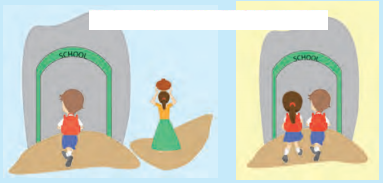
Answer:
Set (i) In the first panel a boy is going to school while a girl of the same age is doing household chores. In the next panel, both the boy and the girl are going to school.
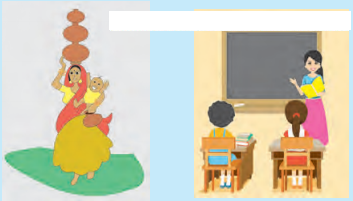
Answer:
Set (ii) In the first panel, a woman is trudging along balancing pots of water on her head and a baby on her hip. In the next panel, a woman is teaching children at a school.

B. Now write what you observe in the following two pictures:

Answer:
(i) In the first panel a boy and a man are shown sharing the household chores, leaving the women to do other work.
(ii) In the next panel, men and women are working in an office together at an equal level.
C. Which pictures reflect gender equality? Write their numbers.
Answer:
The pictures on the right-hand side of:
(A) and both the pictures of
(B) reflect gender equality.
D. Write down any two slogans on gender equality.
Answer:
(i) Let’s have peace and unity
For all, give equal opportunity.
(ii) Men and women, Are all the same.
Please stop playing, This discrimination game.

1. A. Find from the lesson words/phrases that mean the following:
Question a.
colours …………
Answer:
Hues.
Question b.
a person who writes for newspapers/magazines …………
Answer:
Journalist.
Question c.
make a difference between ………
Answer:
Discriminate.
Question d.
cryover ………
Answer:
Lament
Question e.
explain in detail ………
Answer:
Throw light on.

Question f.
abilities and qualities ……….
Answer:
Potential
Question g.
same availability ……….
Answer:
Equal Access
Question h.
a person who brings about a social/political change …………
Answer:
Activist.
1. B. Pick out five Compound words from the lesson.
Answer:
- anywhere
- household crystal-clear
- courtyard
- reading room
- middle-aged

2. Answer in your own words:
Question a.
Read and write down 5 points which prove that Tomba, (Lanthoi’s father) firmly believes in gender equality.
Answer:
The facts which prove that Tomba firmly believes in gender equality are:
- Tomba is supportive of Ashang bis activities as a woman’s rights activist.
- He advocates the cause of women.
- He does not discriminate between a man’s work and a woman’s work.
- He shares equally with Ashangbi in doing the household chores like cooking, washing, etc.
- He tells Lanthoi that the world is still full of inequalities and they have to find a way to bring equality between men and women.
Question b.
In what ways is Ashangbi different from other women of her community?
Answer:
Ashangbi is different from other women of her community:
- she is a woman’s rights activist
- she is a journalist is different
Question c.
What are the provisions in the Declaration of the United Nations, to ensure equality of men and women?
Answer:
The provisions In the Declaration of the United Nations to ensure equality of men and women are:
- equal access to basic social services including health and education.
- equal participation in political and economic decision-making.
- equal reward for equal work, and
- elimination of discrimination and violence against women.

3. Who said to whom and when / why?
| Who said? | To Whom? | When/why? | |
| ………the world is full of inequalities | |||
| I want to do something interesting | |||
| It is against the will of God | |||
| Our home is full of love…….. | |||
| ……….we can affirm along with United Nations that men and women are equal. |
Answer:
| Who said? | To Whom? | When/why? | |
| ………the world is full of inequalities | Tomba | Lanthoi | When he is discussing gender equality with his daughter. |
| I want to do something interesting | Lanthoi | Ashangbi | When she wants to discuss something with her mother. |
| It is against the will of God | Ashangbi | Lanthoi | When she is talking about the subjugation of women. |
| Our home is full of love…….. | Lanthoi | Ashangbi | When she is discussing gender equality with her mother. |
| ……….we can affirm along with United Nations that men and women are equal. | Ashangbi | Lanthoi | When Lanthol asked her about the provisions available to enable women to express their potential and set themselves free from suppression. |
4. We have studied in previous classes that Pronouns are nords used instead of Nouns.
We also know about Personal Pronouns like I, you, he, she, my, your, his, her, they etc.
There are other words also which are used in place of nouns.
(i) This, that, these, those point to some noun.
For example: ‘Ihi is a kingfisher.’ Those are herons.’ Such Pronouns are called Demonstrative Pronouns.
(ii) Some pronouns not only replace nouns, but also connect two sentences.
For example : Biology is a science. It studies living organisms.’
Biology is a science which / th studies living organisms.
Some other such pronouns are who, whose, whom etc.
They are called Relative Pronouns.

(iii) Some pronouns are used to ask questions.
For example: What is your name?
Which is your coat?
Who is your coach?
The underlined words are Interrogative Pronouns.
Underline the Pronouns in the following sentences and name their types:
Question 1.
What do you want to do?
Answer:
What
do
you
want to do?
What – Interrogative Pronoun
you – Personal Pronoun
Question 2.
It is because of your father that I feel no inequality.
Answer:
It is because of
your
father that
I
feel no inequality.
your, I-Personal Pronoun
Question 3.
This is what your topic means.
Answer:
This
is what
your
topic means.
This – Demonstrative Pronoun;
your-Personal Pronoun

Question 4.
She is fascinated by the small trail, which winds up the mountain.
Answer:
She
is fascinated by the small trail,
which
winds up the mountain.
She – Personal Pronoun
which – Interrogative Pronoun
5. Read the following lines. Imagine it is the beginning of an instance you have experienced. Complete the incident using your imagination. Give it u positise ending. I had often noticed that in my neighbour’s family, the son was greatly pampered, but the daughter was treated unfairly. I could not bear this. So one day I decided to ………….
Continue the write-ups with your own ideas, in about 12 – 15 lines.
Answer:
I had often noticed that in my neighbour’s family, the son was greatly pampered, but the daughter, Meera, was treated unfairly. I could not bear this. So one day I decided to do something about it. I knew that as a young girl, I could not go in and give them advice. It had to be done diplomatically. I decided to make a folder of stories of successful women who had scaled wonderful heights and were greatly respected. I also made a list of women entrepreneurs and their lives. It took me a long time to do this, but it also became my project at school and I got guidance from my teacher and my mother. They asked me to make a power-point presentation too, in addition to the folder. After about three months of hard work. my project was complete.
One afternoon, when I knew that Meera’s mother would be alone at home, I took my presentation and my folder. Pretending that I wanted her opinion on my school project, I showed her the entire presentation. My plan was successful. At the end of two anxious hours, Meera’s mother turned round and hugged me. “I get your message,” she said through her tears. “We have been unfair to Meera. We will rectify it immediately. Thanks, dear.”
I don’t know the marks I will get in school for my project, but according to me, it is already in the A+ category. It has made a positive impact. And that’s enough reward for me.

6. Project :
From your school library or internet collect quotations/slogans promoting gender equality. Make decorative posters with pictures of outstanding women or sketches or illustrations of your choice. With permission, put up the posters in your school surroundings.
Class 8 English Chapter 2.2 Nature Created Man and Woman as Equals Additional Important Questions and Answers
Simple Factual Activities:
Question 1.
Make a list of the beautiful natural surroundings of the house.
Answer:
- A small stream of crystal clear water.
- The green mountains
- A stretch of hundreds of acres of fertile land with yellow mustard flowers.
- A garden in front of the house.
- Many kinds of trees bearing flowers of different colours and fruits.
- Fragrant jasmine.

Question 2.
Write down the ways in which Ashangbi is different from other women of her community.
Answer:
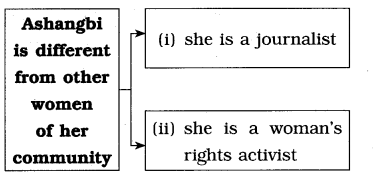
Question 3.
What help did Lanthoi need from her mother?
Answer:
Lanthoi was going to speak on the topic ‘God created men and women as equals’ at her school. She wanted to have some discussion with her mother on the topic.
State what kind of sentences the following are:
Question 1.
Tell me what you want to do.
Answer:
Imperative
Question 2.
Will you spare some time to have a discussion with me ?
Answer:
Interrogative
Personal Response:
Question 1.
Do you think that a woman should have a paid job outside the house or stay at home as a full-time homemaker?
Answer:
I think that depends on the woman and the circumstances. If she is qualified and wants to pursue a career, she should do so. If she wishes to stay at home, she should do that. It is important that she should have the freedom to choose and do as she wishes.

Answer in brief:
Question 1.
What did Lanthoi’s father work as?
Answer:
Lanthoi’s father Tomba is a lawyer and a social wrorker, who advocates the cause of women.
Question 2.
What does Ashangbi feel about Tomba’s views on gender equality?
Answer:
Ashangbi is appreciative of Tomba’s view on gender equality.
Complex Factual Activities:
Question 1.
List the ways in which Tomba contributes towards Ashangbi’s success.
Answer:
The ways in which Tomba contributes towards Ashangbi’s success are:
- Tomba is supportive of Ashangbi’s activities.
- He is always proud of his wife and children.
- In times of need, he helps his wife and children.
- He does not discriminate between a man’s work and woman’s work.
- He shares equally with Ashangbi in doing the household chores like cooking, washing, etc.
Question 2.
Describe how mother explained Lanthoi’s topic for her speech at school.
Answer:
Lanthoi’s topic for her speech was ‘God created men and women as equals.’ Ashangbi explained to Lanthoi that God has sent men and women to our earth to share the joys and sorrows of life equally, to share His blessings and to enjoy the bounty of nature equally. Hence, men and women are equals and should be treated as such.
Question 3.
Write down five points which prove that Tomba firmly believes in gender equality.
Answer:
The facts which prove that Tomba firmly believes in gender equality are:
- Tomba is supportive of Ashangbi’s activities as a woman’s rights activist.
- He advocates the cause of women.
- He does not discriminate between a man’s work and woman’s work.
- He shares equally with Ashangbi in doing the household chores like cooking, washing, etc.
- He tells Lanthoi that the world is still full of inequalities and they have to find a way to bring equality between men and women.

Personal Response:
Question 1.
In olden days, men and women had ‘fixed’ roles to play, and ‘fixed’ jobs to do. Do you think there should be a change in this today?
Answer:
Yes, as society changes and progresses we must change the ‘fixed’ roles and ‘fixed’ jobs too. Today, when women are going out, working and adding to the family income, men too should help in the house. Women have learnt to do many jobs which were earlier done only by men. Men too should learn to do jobs which were earlier done only by women.
Write whether the following statements are True or False:
Question 1.
Lanthoi’s grandmother has narrated many stories about brave queens to her.
Answer:
True
Question 2.
Lanthoi found the topic of pioneer women boring.
Answer:
False
Question 3.
Linthoingambi and Kuranganayani were brave kings.
Answer:
False
Question 4.
Lanthoi has a lot of respect for Ashangbi.
Answer:
True
Complex Factual Activities:
Question 1.
Describe how the role of a mother is honoured and praised.
Answer:
The mother is said to be the fountain of love in the family. This bond of love cannot be compared to anything else in the world. Motherhood has been glorified because of this and therefore women accept the challenges in life to become a mother.

Question 2.
Complete the web showing the achievements of modern women.
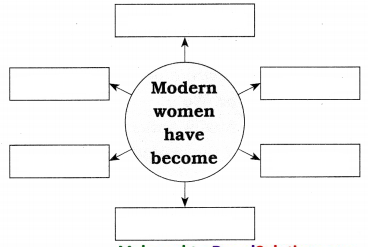
Answer:
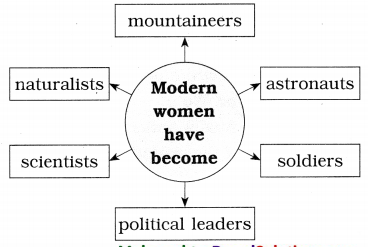
Write the noun forms of the following words:
- know
- qual
- narrated
- brave
Answer:
- knowledge
- equality
- narration/narrator
- bravery
Activities based on Contextual Grammar:
Question 1.
This bond of love Is beyond comparison with anything else in the world.
(Make the sentence negative.)
Answer:
This bond of love cannot be compared with anything else In the world.
Question 2.
Life is not possible without both women and men.
(Make the sentence affirmative.)
Answer:
Life is impossible without both women and men.

Personal Response:
Question 1.
Have you read stories/biographies of successful women? Did you like them?
Answer:
Yes, I have. I have read about Rani Laxmlbal. I have also read short stories and articles about women like Marie Curie, Sudha Chandran, Annie Besant, Mother Teresa, etc. like them and find them motivating.
Write ‘Yes’ or ‘No’:
Question 1.
Lanthoi finally understands what the topic of the symposium means.
Answer:
Yes
Question 2.
Ashangbi satisfies her daughter’s curiosity.
Answer:
Yes
Question 3.
Lanthoi is unsure and nervous about her presentation.
Answer:
No
Question 4.
The United Nations has affirmed that men and women are equals.
Answer:
Yes

Complex Factual Activities:
Question 1.
Write down the provisions in the Declaration of the United Nations to ensure equality of men and women. OR What social justice does the aegis of the United Nations guarantee?
Answer:
The provisions In the Declaration of the United Nations to ensure equality of men and women are:
- equal access to basic social services including health and education.
- equal participation in political and economic decision-making.
- equal reward for equal work, and
- elimination of discrimination and violence against women.
Question 2.
Describe the vision that meets Lanthoi’s eyes when she rushes outdoor.
Answer:
When Lanthoi rushes outdoors, she is welcomed by the bright morning sun. The blue sky and the range of mountains : appear to meet. Lanthoi is fascinated by a small trail which goes winding up the ; distant purple mountain.
Pick out the subject and predicate:
Question 1.
He extends his helping hand to his wife and children and to the society at large.
Answer:
He-subject
extends his helping hand to his wife and children and to the society at large-predicate
Question 2.
Use the word ‘share’ as a noun and a verb in two separate sentences:
Answer:
(i) The wicked brother wanted his share in the property, (noun)
(ii) The poor woman shared the loaf of bread with her children, (verb)
Writing Skills
Read the following lines. Imagine that it is the beginning of an instance you have experienced. Continue the write-up with your own ideas, in about 12-15 lines and complete the incident using your imagination. Give it a positive ending.
I had often noticed that in my neighbour’s family, the son was greatly pampered, but the daughter was treated unfairly. I could not bear this. So one day I decided to ……………..
Answer:
I had often noticed that in my neighbour’s family, the son was greatly pampered, but the daughter, Meera, was treated unfairly. I could not bear this. So one day I decided to do something about it.

I knew that as a young girl, I could not go in and give them advice. It had to be done diplomatically. I decided to make a folder of stories of successful women who had scaled wonderful heights and were greatly respected. I also made a list of women entrepreneurs and their lives. It took me a long time to do this, but it also became my project at school and I got j guidance from my teacher and my mother.
They asked me to make a power-point presentation too, in addition to the folder. After about three months of hard work, my project was complete. One afternoon, when I knew that Meera’s mother would be alone at home, I took my presentation and my folder. Pretending that I wanted her opinion on my school project, I showed her the entire presentation.
My plan was successful. At the end of two anxious hours, Meera’s mother turned round and hugged me. “I get your message,” she said through her tears. “We have been unfair to Meera. We will rectify l it immediately. Thanks, dear.” I don’t know the marks I will get in ; school for my project, but according to me, it is already in the A+ category. It has made a positive impact. And that’s enough reward for me.